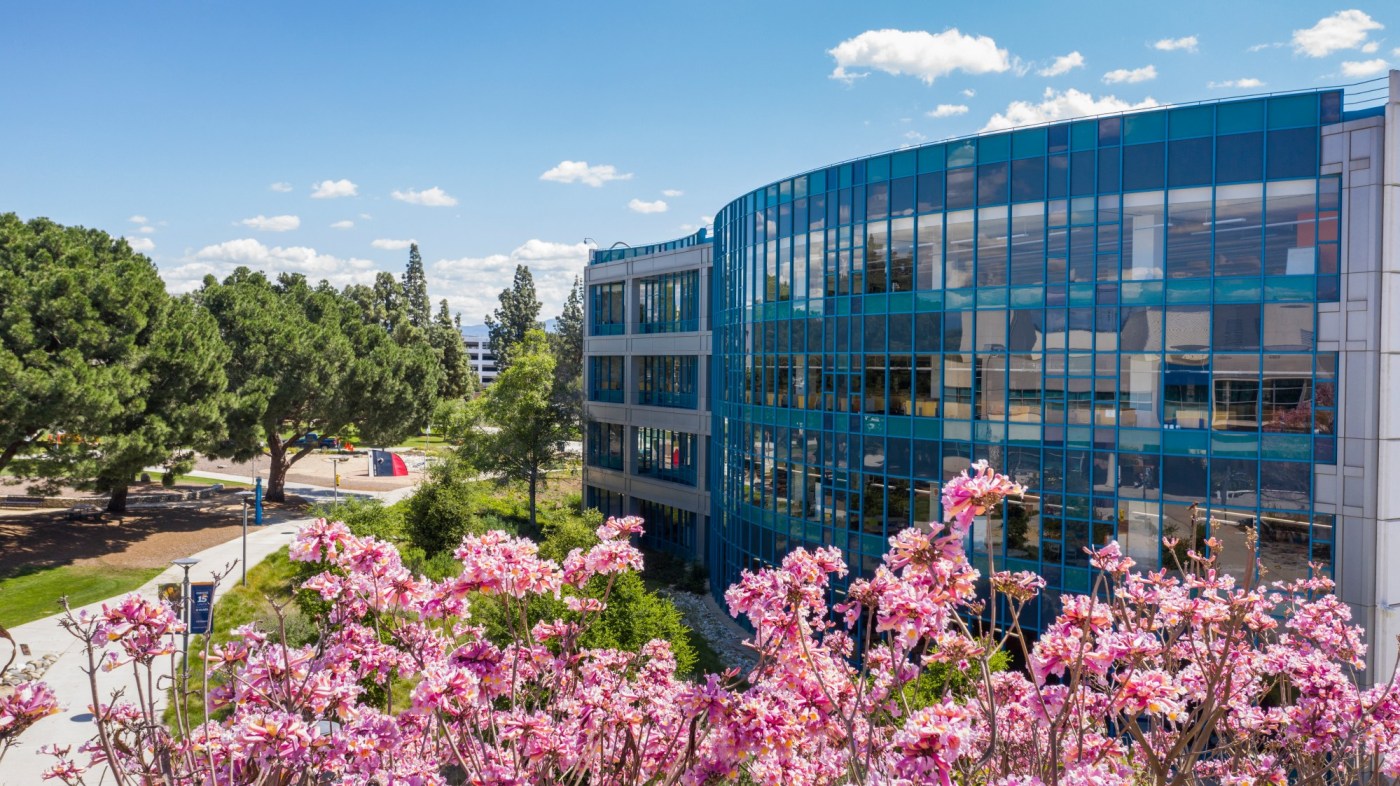Like it or not, artificial intelligence is here to stay, and it’s reshaping the world of education. The Cal State University system last spring created the Artificial Intelligence Educational Innovations Challenge, inviting academics from throughout the state to develop projects related to AI. Of the 63 winning projects (out of more than 400 proposals), three were created by Cal State Fullerton faculty.
History in a new light
Developed by history professors Allison Varzally and Volker Janssen, “Past, Present and Future: Intentional and Ethical Activation of AI in the Teaching of U.S. History Survey Courses” explores AI’s influence on students’ reading, writing and critical-thinking skills.
“Many students use AI as a reflective ‘answer box,’ ” Varzally said. “We’re concerned that they’re not learning historical skills or knowledge. So, we’re looking at adjusting our assignments, activities and assessments accordingly. It may require using AI tools more extensively, or it might involve doing things differently in our classrooms.”
The four CSUF survey courses included in this project are HIST 170A, United States to 1877; HIST 170B, United States Since 1877; HIST 180, Survey of American History; and HIST 190, Survey of American History with Emphasis on Ethnic Minorities.
The project is composed of four collaborative workshops. “In the first workshop, which has already occurred, Department of History faculty shared their experiences in the classroom,” Varzally said. “And we had someone from Instructional Technology Services teach us about some AI tools.”
Future workshops will focus on historical sourcing, questions of bias, the writing “voice” used in assignments, and alternatives to essays – including podcasts, short documentaries and oral presentations – that may help students in an ever-changing academic environment.
“We want to make history more accessible,” Varzally said, “and that may involve different formats created by our students. … AI has definitely been a stimulus to revisit our methods of teaching.”
Modeling critical thinking
When Laura Keisler, assistant professor and undergraduate coordinator of Literacy and Reading Education, examined the study “GenAI and Expertise Paradox” (Mishra, 2025), it brought to mind many of her students. The study focuses on how overreliance on generative AI can lead to quick answers while hindering critical thinking.
Keisler and Madeleine Mejia, associate professor in the same CSUF department, are spearheading “Cultivating a New Culture of Thinking, Learning and Being in the AI-Driven 21st Century,” a project that addresses this issue. Their efforts are being applied to READ 290, Critical Reading, Thinking and Literacy.
“This semester, I’m piloting some of our ideas and involving students in activities and projects,” Keisler said. “And this spring, Madeleine will put these ideas into action.”
Keisler and Mejia noted that students who lack both domain experience (knowledge in a specific area of study) and familiarity with GenAI tend to accept digital answers as gospel. “Students aren’t developing their critical thinking skills if they’re over-relying on GenAI,” Keisler said. “We want them to use AI to sharpen that critical thinking. So this semester, I’m modeling in class how I interact with AI; students are looking at and evaluating my own thinking.”
Mejia will continue this modeling process next semester. “We’re exploring what our students are doing in real time, and we’d also like to see what impact our work has when they’re on their own,” she said. “We’re also examining how we’re preparing our students to substitute, combine or adapt ideas, how they modify their thinking and make changes.”
Divide and conquer
Led by Matheus Guerrero, assistant professor of mathematics, “LIFT: Learning with AI, Implementing Change, Fostering Equity, Transforming Teaching” is a multidisciplinary project focused on STEM subjects: geology, chemistry, statistics and math.
Guerrero and three CSUF colleagues – Alyssa Beach, geology lecturer; Ryan Cammarota, assistant professor of organic chemistry; and Francisco Zepada, math lecturer – will compare the effectiveness of AI-based and non-AI-based activities to elements of their respective academic specialties. Each faculty member will work with and mentor one student, who will design the AI-based work.
“The core of the project is: Does AI really work in the classroom?” Guerrero said. “So we’re testing it there.”
An AI activity created by a student under the supervision of Guerrero will be used in teaching “p-value,” an often-misunderstood element of statistics; Guerrero will design the non-AI activity with the same learning goals. Half of the students in MATH 338, Statistics Applied to Natural Sciences, will be randomly selected to receive the AI activity, and the other half will be instructed without AI.
“Students will complete a concept check on p-values before and after the activity,” Guerrero said, “along with a survey on confidence, perceived relevance, interest or enjoyment, mental effort, clarity of the materials and, when applicable, quality of peer interaction.”
Guerrero’s colleagues will run parallel designs in their own courses: Cammarota in CHEM 301A, Organic Chemistry; Beach in GEOL 101, Introduction to Geology; and Zepeda in two courses: MATH 10S, Mathematics for Liberal Arts Supplement, and MATH 250A, Calculus III.
